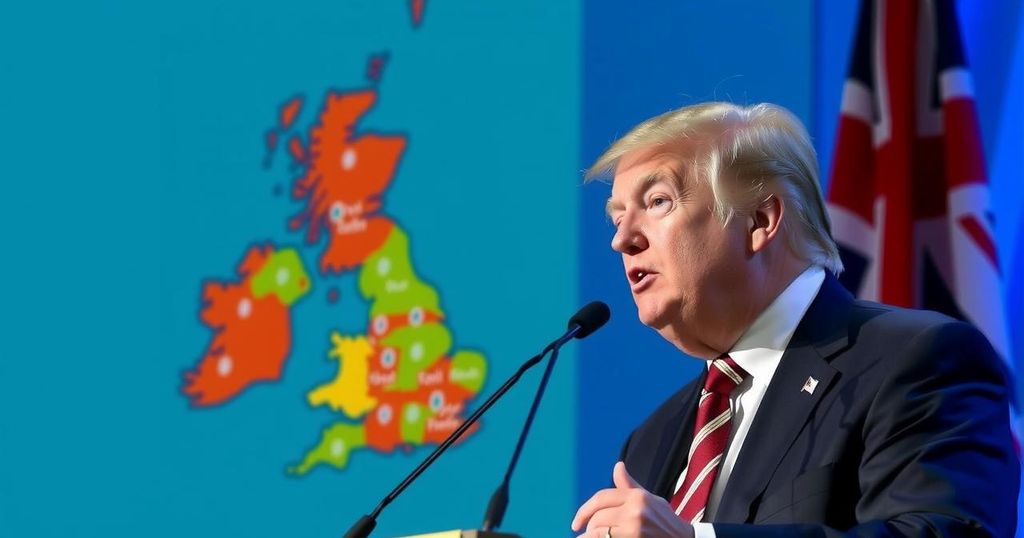UK to Lead Climate Efforts at COP29 Amidst Trump’s Re-Election Threats
Energy Secretary Ed Miliband asserts that the UK must strengthen renewable energy efforts to safeguard national security. As COP29 approaches, the UK plans to lead in climate negotiations following Trump’s re-election, which poses significant challenges for global climate agreements. Financial aid for developing nations and calls for ambitious climate action will be central themes amidst changing political dynamics.
The United Kingdom must intensify its commitment to renewable energy to bolster national security amidst global uncertainty, as emphasized by Energy Secretary Ed Miliband prior to a crucial climate summit, COP29. He expressed that the UK would assume a leadership role at the summit to secure an international accord aimed at mitigating severe climate impacts, particularly in light of Donald Trump’s recent re-election and his potential withdrawal from the Paris Agreement. Miliband stated, “The only way to keep the British people secure today is by making Britain a clean-energy superpower…” he underscored the government’s resolve to accelerate climate actions that will ultimately protect the nation’s energy security and economic stability. With Trump having previously labeled climate science a “hoax” and his intentions to withdraw the U.S. from the global climate framework, countries are re-evaluating their strategies. Trump’s policies pose a significant threat to global climate goals, and the present summit in Baku, Azerbaijan, has already experienced notable cancellations from several key leaders such as EU Commission President Ursula von der Leyen and German Chancellor Olaf Scholz. The presence of UN Secretary General António Guterres and representatives from approximately 100 developing nations will be pivotal as they face the dire economic consequences of climate disasters. Miliband plans to actively engage in the negotiations rather than delegating responsibilities, asserting the UK’s ambition to lead in international climate efforts. He emphasized that the UK would call on other nations to fulfill their commitments to combating climate change. Former chair of the UK’s Committee on Climate Change, Adair Turner, cautioned against superficial optimism, noting, “there is a tendency by some people to try to keep their spirits up by whistling in the dark. But this [Trump’s election] is bad, let’s be clear.” As developing nations pursue financial aid to manage climate challenges, they aim for a substantial commitment of around $1 trillion annually by 2035. However, without U.S. participation, leading countries may limit this financial support considerably. Solutions proposed include taxing fossil fuels and the wealth of billionaires, alongside potential levies on high-carbon activities, although such proposals are likely to encounter opposition. David Hillman, director of the group Stamp Out Poverty, urged the UK government to not use Trump’s re-election as an excuse to diminish its ambitions for COP29, advocating for the necessary financial measures to address the climate crisis effectively.
The article centers on the significant role of the UK in global climate negotiations, particularly in the lead-up to the COP29 summit in Baku, Azerbaijan. With the recent re-election of Donald Trump raising concerns about U.S. commitment to climate agreements, the UK aims to step forward as a leader in international climate action. The piece highlights the necessity of renewable energy for national security and economic stability while addressing the urgent need for substantial financial support for developing nations facing climate challenges.
In summary, Ed Miliband’s call for the UK to lead at COP29 highlights the critical intersection of national security and renewable energy amidst geopolitical uncertainties. With the looming threat of reduced U.S. cooperation under Trump, the UK’s proactive stance is essential for fostering global climate action. Urgent financial commitments are imperative for supporting vulnerable nations in combating climate change impacts, underscoring the global responsibility to mitigate environmental degradation.
Original Source: www.theguardian.com




Post Comment